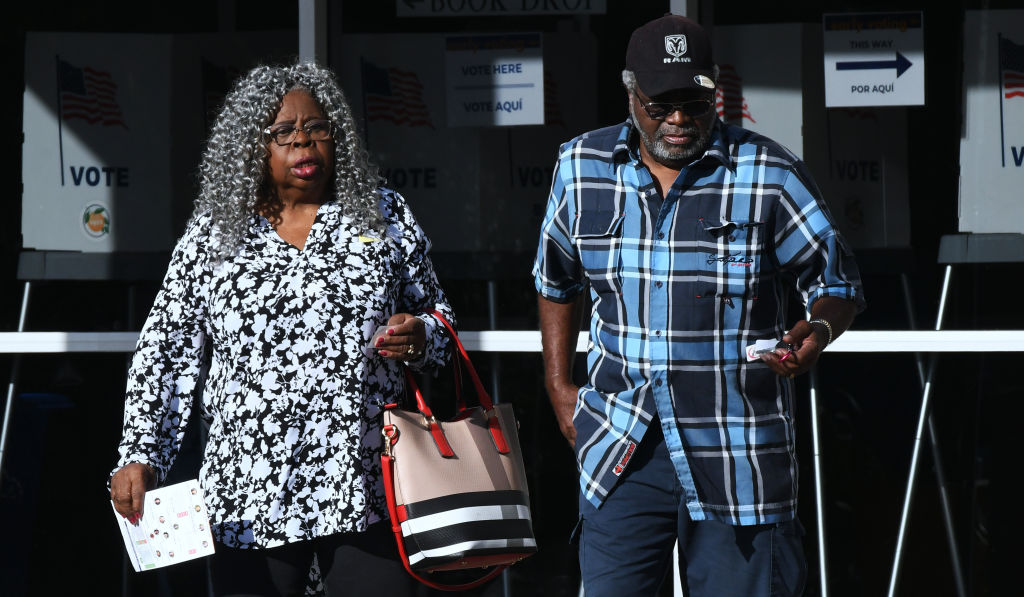Early Voting Trends: What’s The Turnout Among Black Voters?
Source: Anadolu / Getty
As early voting starts nationwide, attention turns to key communities where turnout can significantly influence election outcomes.
Among those, Black voters remain a crucial voting bloc, often facing unique challenges when trying to express their right to vote.
In the 2020 election, many people voted early due to necessity because of the coronavirus pandemic. But, in 2024, many voters are just choosing to vote early this year.
With just a little more than a week before Election Day, almost 18 million Americans have already voted, but what do the numbers actually say about turnout? Are Black voters showing up at the polls in record numbers, or has election fatigue left them uninterested?
The answer could shape the outcome of some important races in this election and offer insights into the broader political landscape of 2024.
The Candidates
Vice President Kamala Harris and her team have prioritized early voting and have pushed for their constituents to utilize early voting, especially in battleground states like Georgia, North Carolina, and Michigan.
Trump’s team has taken a different approach, demonizing early voting, though his Republican counterparts have been pushing for early voting despite Trump’s rhetoric.
The Numbers
Taking a look at where the candidates stand on early voting is important, but the true test lies in the numbers. Early voting has already begun and we’re starting to see emerging trends. But how are Black communities responding? Are they embracing early voting in key battleground states?
In North Carolina, on the first day of early voting, a record 353,000 ballots were cast, even though the state was still recovering from Hurricane Helene.
St. Joseph A.M.E. Church in Durham, North Carolina, Central University and other organizations held a “Soar to the Polls” rally to celebrate the first day of early voting. Participants were accompanied by a marching band, who led the enthusiastic voters in a march through the streets to their local polling station.
This AMAZING. North Carolina Central University hosted a “Soar to the Polls” with a marching band & just look at how many young people showed up to soar to the polls. This is why we’re going to win. These young people are going to save us. pic.twitter.com/3qONdUxlSU
— Victor Shi (@Victorshi2020) October 19, 2024
Louisiana followed suit, also with a record number of 177,000 ballots cast on the first day of early voting. Georgia has also seen huge gains in early voting as the state has set a daily record for in-person early voting nearly every day since polls opened last Tuesday. According to the New York Times, more than 1.5 million voters have already cast an early ballot in the critical battleground state.
CNN recently published early polling data from seven battleground states: Arizona, Georgia, Michigan, North Carolina, Nevada, Pennsylvania and Wisconsin.
The chart shows the distribution of pre-election ballots cast, as of 15 days before the election, by race and ethnicity now compared with four years ago.
The charts suggest that early voting among Black Americans has grown since 2020 at the same level as it has for white Americans, but it reveals that Black voters are still very engaged this election cycle. According to CNN, in North Carolina, 30% of early voters were Black. The state’s Black population is 12.4%. Although that number is down from 33% in 2020, it still suggests a high turnout of Black Americans during the weeks of early voting. This trend continues in other battleground states, including North Carolina, Michigan and Pennsylvania. Arizona had the smallest percentage of Black voters who voted early, but the state is only 4.8% Black.
As early voting continues, the turnout data from Black communities paints a picture of sustained engagement despite the challenges and competing narratives surrounding the Black vote. While some numbers have slightly dipped since 2020, the overall high participation shows that Black voters are still a driving force in key battleground states. Their turnout could be the deciding factor in shaping not only our future political landscape but also the future of this nation.
SEE ALSO:
BPAC’s Adrianne Shropshire Raises Awareness For Black Voters And The 2024 Election
Black Voters Matter Launches College Bus Tour At HBCU Lincoln University

